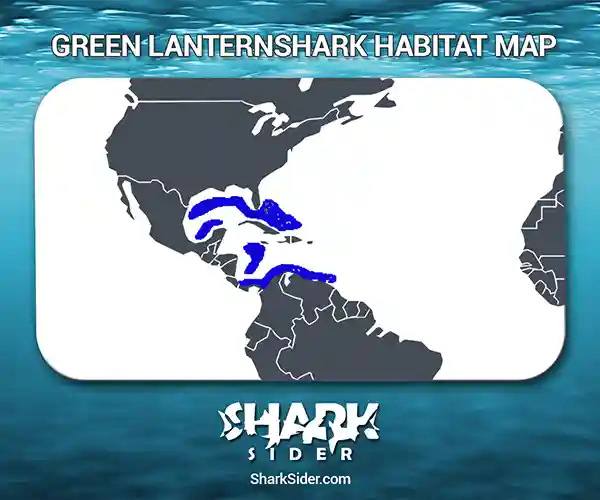The green lanternshark is a small species of dogshark living in the depths of the oceans.
Green Lanternshark Scientific Classification |
|
| Kingdom | Animalia |
| Phylum | Chordata |
| Class | Chondrichthyes |
| Order | Squaliformes |
| Family | Etmopteridae |
| Genus | Etmopterus |
| Scientific Name | E. virens |
Description
These sharks are tiny, only reaching a maximum length of 10 inches. They have blunt faces, with enormous eyes covering most of the surface area. There are 29–34 rows of teeth in the upper jaw and 24–32 in the lower one.
Noticeably, the second dorsal fin in these sharks is much larger than the first, though both have a spine protruding from them. There are cone-shaped dermal denticles on the flanks of the green lanternshark.
Dorsally these sharks are dark brown to gray, while ventrally, they are black.
Where do they live
Map Of The Green Lanternshark’s Habitat

It has a small distribution from the Gulf of Mexico to the Caribbean Sea, spotted in Cuba, Florida, Honduras, Nicaragua, Panama, Texas, Venezuela, and the Yucatan Peninsula.
As a deep-sea species, this shark lives at depths of 643–3,002 ft but is commonly seen at around 1,150 ft.
Behavior
Hunting
These sharks feed on octopi and squid, hunting in packs to bring down the bigger animal by biting off pieces of their flesh.
Social
Green lanternsharks travel in schools.
Reproductive
Female sharks give live birth to 1-3 young. Initially, these sharks are 3.5 inches long, with the males becoming sexually mature at 7.2–9.3 inches and the females doing so at 8.7–10.1 inches.
Adaptations
These sharks produce light from photophores on the black segments on their bodies, using the generated light to coordinate with other green lanternsharks while swimming.
Interactions with humans
The IUCN lists the green lanternshark as “Least Concern” or “LC”, as these sharks have no commercial value and are not endangered by human activities.
